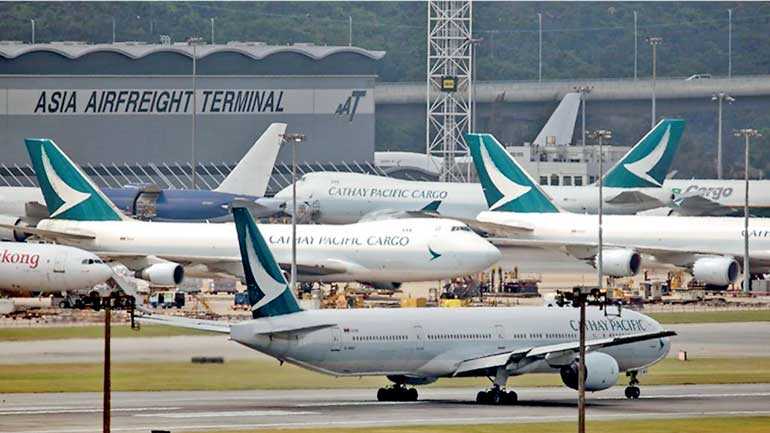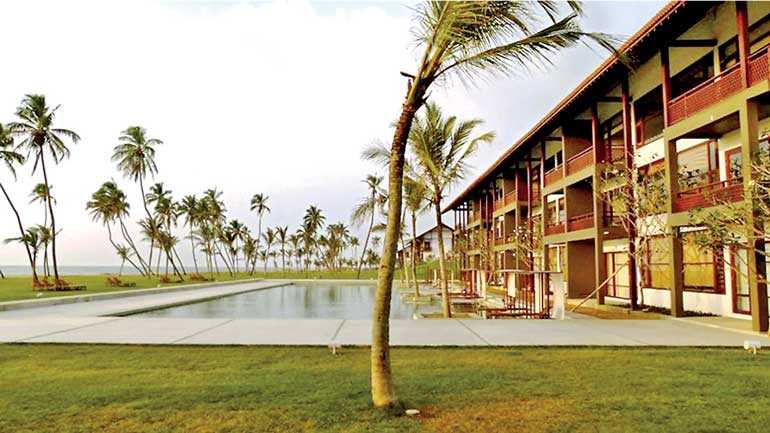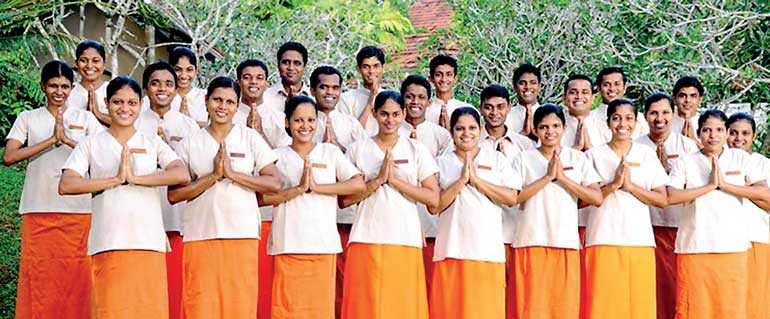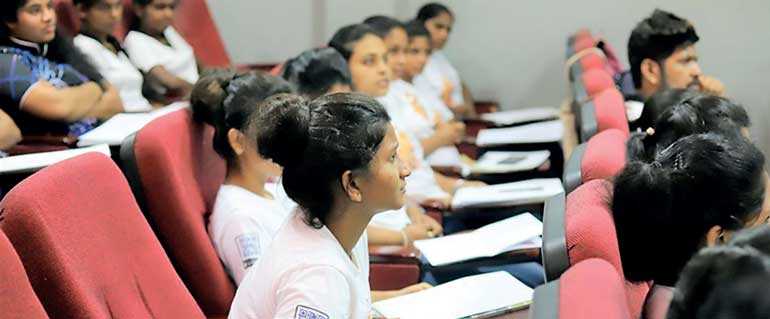
Cathay Pacific has cut back over 75% of its flights per week, with more than half its fleet grounded

Can Sri Lanka subtly ‘send a message to the market’ that we are a relatively safe island destination, with only one popular port of entry, where good health screening is taking place?
Sri Lanka tourism, just raising its head after last year’s 21/4 terrorist attacks, is now facing what could possibly be the worst-ever crisis to hit world tourism – the new coronavirus epidemic (COVID-19).
There are travel embargos and suspension of airline routes to some of the world’s largest tourism source markets including China. While originally there was hope that it would only affect the Chinese outbound market, all such optimistic thoughts are fast receding with over 80 countries now reporting confirmed COVID-19 cases. There seems to be a ‘fear of flying’ creeping through the minds of prospective tourists.
Sri Lanka tourism will therefore have to brace itself for another prolonged downturn and somehow keeping ‘the home fires burning’ until this threat recedes.
But there is a lot that can be done during these ‘slack times’ to plan out new strategies and improve operational efficiency. This short essay attempts to throw out some ideas for consideration.
Since the virus hit the headlines in January, some 92,000 people have contracted the disease in 80 countries with over 3,000 deaths recorded (as at the time of writing). Airlines have already cancelled more than 200,000 flights, mostly to, from and within China because of the virus. Now they are mulling other changes and scrambling to keep up with certain restrictions in flying to certain affected countries. Cathay Pacific which operates in the region, has cut back over 75% of its flights per week, with more than half its fleet grounded. (https://www.bangkokpost.com/business/1869864/cathay-pacific-parks-half-its-fleet-slashes-march-flights) With airports introducing stringent safety measures and screening, air travel has become all that more complicated and difficult. 
The hardest and biggest hit will be tourism, with travellers opting to cancel or postpone their holidays, especially to the east. COVID-19 could potentially cost the global travel industry $ 46.6 billion per month, according to a new poll from the Global Business Travel Association (GBTA). That translates into $ 559.7 billion annually, or 37% of the industry’s total 2020 forecasted global spend.
In a hitherto unprecedented move, the most important tourism event in the world, the ITB (world’s largest travel trade show) held every year in Berlin in early March, has been cancelled, indicating the severity of the impending crisis. Already airlines and online travel agencies (OTA) are laying off staff or sending them on compulsory no pay leave. (https://www.bizjournals.com/seattle/news/2020/02/24/expedia-group-to-lay-off-thousands-of-employees.html)
So there is no doubt whatsoever, that dark days are fast descending on the tourism industry, which will have to face a very rough ride ahead.
So what do we do? Mope and groan and ‘put up the shutters’? Panic and lay off staff, cut maintenance and other operational costs and let the plant deteriorate?
Certainly not, unless one has taken leave of one’s senses. There are opportunities to be capitalised upon, in every crisis. Smart organisations and leaders will ‘think out of the box’ and grab such chances.
Destination marketing
- Certainly since the present (or unfolding) crisis is a global one, there is very little one can do by way of marketing the destination in this climate.
- So branding and long-term strategic marketing initiatives will have to be put on hold, until a clearer picture emerges as to how this crisis is going to pan out.
- Whatever restrictions and health concerns there may be regarding travel, there still will be a small segment of ‘risk takers’ who would still opt to travel.
- Can Sri Lanka therefore subtly ‘send a message to the market’ that we are relatively safe, an island destination, with only one popular port of entry, where good health screening is taking place. And above all where only one case of COVID-19 has been confirmed, and that patient too, has fully recovered and gone back to China. Would this then attract the die-hard traveller, who would have otherwise chosen to travel to some of the popular East Asian tourism destinations?
- Can the tourism stakeholders, with the leadership of the Sri Lanka Tourism Promotion Bureau (SLTPB) and the private sector, use this ‘slack’ time to take a deep hard look at our 10% Chinese market segment that we have been attracting to Sri Lanka?
- It is a known fact that this segment Sri Lanka was attracting, was the lower range (predominantly larger sized, low budget, group tourists) from the vastly diverse and large Chinese market.
- Can we not plan out a ‘new product and service value proposition’ to attract the higher yielding Chinese market segment when the crisis abates, and the Chinese market once again rebounds (as it certainly will)?
- Once this is in place and the execution planned out, we can then plan out an appropriate promotional campaign and be ‘on our marks’, so that it can be launched once the crisis is over.
Operations management Cash flow
- In operations cash is always king, but more so during a crisis.
- So one would need to go through all expenditure and cut down all non-essential outflows.
- But it is most important to refrain from ‘Cost cutting’. The key word is ‘Cost Management’
- Slashing expenditure in the areas of maintenance and housekeeping, (which are always the easiest to ‘cut’), is the worst thing to do and will come at a great cost in the long term
- A new three-month crisis budget should be prepared and that should be tracked. All previous budgets will now be redundant
- ARRs, ADRs and Profit will be no longer of great consequence. The focus should be on Cash flow. Cash is critical at this time
- Cash flow should be reviewed daily, with focus on debt collection and extra vigilance on credit facilities
- Staff
- Staff are the tourism industry’s most important asset.
- Therefore it is important to keep staff in the loop. They will be concerned about what’s going to happen to them, so communicating with them is also important.
- Unfortunately some staff will have to be laid off temporarily especially casual hands
- Having less staff on site will reduce food costs and other peripheral staff costs such as laundering of uniforms.
- All accumulated leave of permanent staff should be given and exhausted
Train and upskill staff
- During normal operational times it is well known fact that staff training of a formal nature takes a back seat. With busy operations going on, most hotels depend on informal on-the-job training with very little corrective supervision.
- It is also a known fact that Sri Lanka tourism is slowly losing its edge in customer care. Warm welcoming smiles and professional and friendly service is fast deteriorating in Sri Lanka tourism, and we are losing one of our main unique selling propositions (USP)
- In which case what better time than a downtime during a crisis such as this, to address this issue?
- Hence a lull in operations created by a crisis is an ideal time to embark on crash courses on training of various skills, (both practical/professional and soft) in a cohesive and organised manner.
- Certain specific shortcomings identified by customer feedback could also be addressed.
- Training should be more along formal lines, with classroom and practical mock-up/role play sessions
- With staff thus well trained, when business recovers the organisation could leverage a more competitive edge in service delivery.
Systems and procedures
- During busy times with need for controls, many procedures and systems are introduced along the way, as and when issues arise in day-to-day operations.
- All these add up over time and cause bottlenecks and bureaucracy, sometimes impeding good customer service and productivity.
- This would be an ideal time to review all operational systems and procedures to eliminate bottlenecks and focus on productivity improvement and streamlining.
- This could also be the ideal time to undertake a work study to review all important work systems and improve/change as needed.
Focus on sustainability
- Sustainable tourism development is the future direction of tourism the world over. Being a country blessed with a range of natural beauty.
- Sri Lanka tourism has therefore to focus on following good sustainable consumption practices (SCP).
- SCP also fast becoming and important aspect that visitors are concerned about, and can be a strong differentiator for tourism service providers
- Downtime during a crisis affords an opportunity to work on this area
- Energy audits in specific areas can be undertaken and staff trained in proper SCP
- Data recording can be reviewed and improved
3.0 Conclusion
It is thus clear that a downtime in a crisis, frees up time of key staff to focus inwards to review efficiency, which otherwise gets neglected in the day to day hustle and bustle of the service industry. It provides valuable time for strategic thinking, without all the day-to-day ‘firefighting’ that goes on during normal times.
Hence the tourism industry stakeholders of Sri Lanka, should take this opportunity to focus on some serious strategic marketing plans, while at the same time streamline their operations, so that when the turnaround arrives, the organisations will be a leaner, more customer focused, competitive, and efficient.

Staff are the tourism industry’s most important asset, therefore it is important to keep staff in the loop. They will be concerned about what’s going to happen to them, so communicating with them is also important

A lull in operations created by a crisis is an ideal time to embark on crash courses on training of various skills, (both practical/professional and soft) in a cohesive and organised manner




